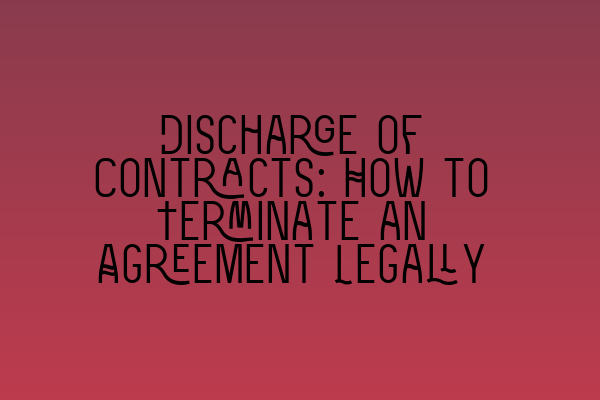As a solicitor, it’s crucial to have a deep understanding of contract law. Contracts are the lifeblood of businesses and individuals, serving as legally binding agreements that govern transactions and relationships. However, there may come a time when you need to terminate a contract. In this blog post, we will explore the concept of discharge of contracts and discuss how to terminate an agreement legally.
What is Discharge of Contracts?
Discharge of contracts refers to the termination of a contractual agreement. When a contract is discharged, the parties involved are released from their contractual obligations, and the agreement comes to an end. There are several ways in which a contract can be discharged, including:
- Performance: The contract is discharged when both parties fulfill their contractual duties and obligations. This is known as complete performance.
- Agreement: The parties involved in the contract can mutually agree to terminate the agreement. This is known as discharging by agreement.
- Breach of Contract: If one party fails to fulfill their obligations under the contract, the other party may choose to terminate the agreement due to the breach.
- Operation of Law: Certain events or circumstances can automatically terminate a contract. These events include frustration, illegality, or death.
Terminating an Agreement Legally
When looking to terminate a contract, it’s important to do so legally to avoid potential legal consequences. Here are a few key steps to follow:
1. Review the Contract
Begin by thoroughly reviewing the terms and conditions of the contract. Look for any specific provisions related to termination or dispute resolution. These provisions may outline the required notice period, termination fees, or conditions for termination. Familiarize yourself with these provisions to determine the appropriate course of action.
2. Communicate with the Other Party
Once you have a clear understanding of the contract and its termination provisions, communicate your intention to terminate the agreement to the other party. It’s crucial to do so in writing and provide a clear explanation for the termination. This written communication will serve as evidence should any disputes arise in the future.
3. Seek Legal Advice
In complex situations or if you’re uncertain about the legality of terminating the contract, it’s advisable to seek legal advice from a qualified solicitor. They can assess the specific circumstances of your case and provide guidance on how to proceed legally.
4. Fulfill Contractual Obligations
Before terminating the contract, ensure that you have fulfilled all your contractual obligations. This includes delivering goods or services, providing any required notice, or resolving any outstanding issues. Failure to fulfill your obligations may result in legal consequences.
5. Document Everything
Throughout the termination process, make sure to document every step you take. Keep copies of all correspondence, including letters, emails, or any other relevant communication. These documents will serve as evidence if any disputes arise later.
6. Obtain a Release
If both parties agree to the termination, it’s advisable to obtain a release or termination agreement signed by both parties. This document will confirm that both parties are released from their contractual obligations and will help mitigate any future disputes.
Conclusion
Terminating a contract requires careful consideration, adherence to legal procedures, and clear communication with the other party. By understanding the concept of discharge of contracts and following the proper steps, you can terminate an agreement legally and protect your rights and interests.
If you’re preparing for the SQE exams, check out these related articles:
